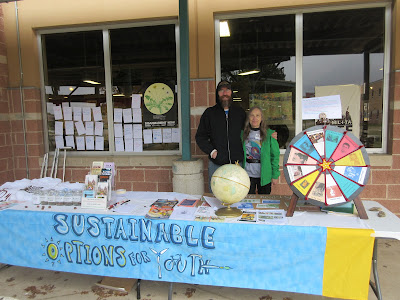Here is an excellent editorial piece co-written by our friend, Paula Rogge, a medical doctor living in Madison, WI and formerly of Austin, TX. This was published in the Madison State Journal on January 13, 2018.
As we conduct Penny Polls in our schools during SOY tabling, students overwhelmingly vote for more tax funding for education, health care and environmental protection and not for more weapons.
This reflects what a majority of people want: funding for human needs, not war.
Massive Military Spending is Immoral
by Paula Rogge, Jerry Folk and Maureen McDonnell
Madison State Journal Jan. 13, 2018
Many of us enjoyed the holidays with family and friends last month. But as we start a new year, we must remember that for hundreds of thousands of people in Iraq, Afghanistan, Syria and Yemen, this has been a time of death and injury, separation from family and friends, homelessness, cold, hunger and illness.
In the coming weeks, Congress is planning to vote on a military appropriations bill that will raise military spending to $700 billion in 2018. This includes $634 billion for the military’s regular operations. An additional $66 billion is budgeted for military operations in Afghanistan, Iraq, Syria, Somalia, Niger and Yemen. If approved, about 60 percent of our discretionary budget will go to the military.
The $700 billion includes funding for aircraft and combat ships the Pentagon did not ask for, and for flawed weapon systems such as the F-35 fighter jet.
The bill allocates money for a new ground-launched nuclear cruise missile that could reignite a nuclear missile race with Russia. And it budgets funds for nuclear weapons modernization. Championed as a “deterrent” to world war, nuclear weapons now threaten international security. Spread of these weapons to countries such as North Korea, as well as cyberattacks and attempts by terrorist groups to buy or build nuclear devices, have greatly increased the chances of a nuclear accident or attack.
The cost of war is not only financial, it is human. As of March 2015, an estimated 210,000 civilians had died violent deaths as a result of the wars in Iraq, Afghanistan and Pakistan. In the last three years, the U.S.-led air strikes against the Islamic State in Syria have killed thousands of civilians. At least 10,000 Yemeni civilians have been killed since 2015 in the U.S.-supported, Saudi Arabia-led war on Yemen, most of them during airstrikes on civilian areas, hospitals and schools. Hundreds of thousands more of non-combatants have died due to exposure, lack of food, clean water and health care arising from these wars. In Yemen, half a million people have contracted cholera, and famine now threatens the country.
What damage has this continual overseas war done at home? Over 6,000 of our soldiers have been killed and 47,000 have suffered physical, psychological and moral injuries in the Iraq and Afghan wars. The Pentagon’s huge budget has meant less domestic spending on health care, education, job creation, infrastructure and a safety net for our most vulnerable citizens.
The United States spends more on the military than Russia, China, the UK, France, India, Saudi Arabia and Japan combined. But when we participate directly or indirectly in armed conflicts abroad, especially when we kill civilians, we create enemies. When we destroy homes, hospitals, schools, factories and infrastructure, we make it almost impossible for survivors of war to rebuild their countries enough to sustain a lasting peace.
The budget is a moral document that reflects our national priorities. If we respect human life, surely we can find more creative, constructive ways of defending our nation than relying on massive military spending. We must urge our leaders to redirect tax dollars from guns and bombs to foreign aid, diplomacy and economic sanctions to prevent wars. We must limit government weapon sales to combatants. We must aid those displaced by wars. And we must redirect Pentagon dollars to urgently needed domestic programs.
Our tax dollars should be used to protect and sustain, not endanger lives abroad and at home.
Rev. Folk is former executive director of the Wisconsin Council of Churches. McDonnell is a Dominican Sister and board member of Worker Justice Wisconsin. Dr. Rogge is a member of Physicians for Social Responsibility-Wisconsin. They all are members of the Ecumenical Peace Working Group of Wisconsin.



























































